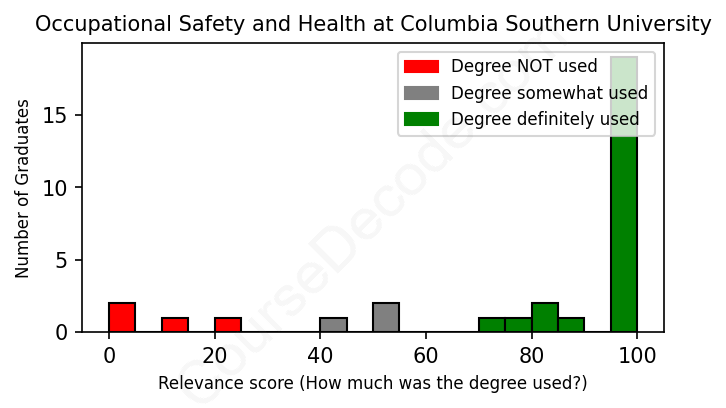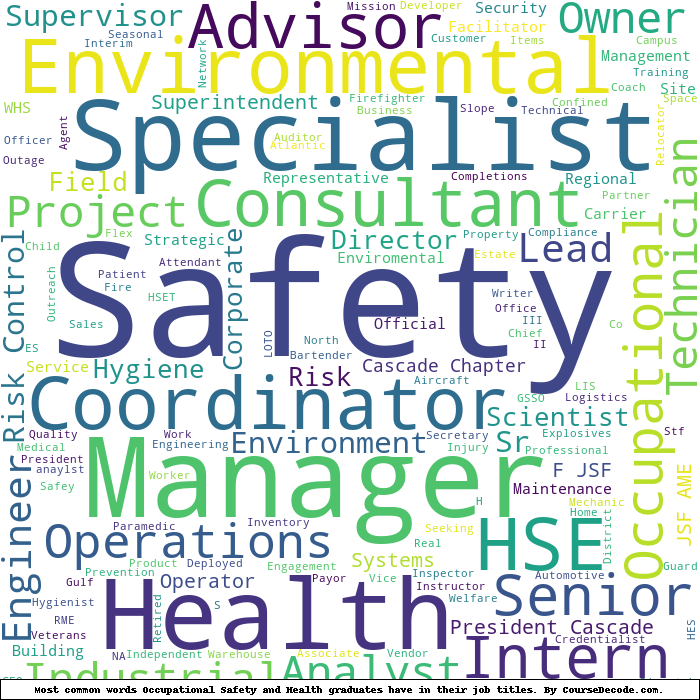
First, some facts. Of the Occupational Safety and Health graduates from Columbia Southern University we've analyzed , here's how many have used (or NOT used) their degree in their career:

These are estimates based on AI analysis of 31 LinkedIn profiles (see below).
The verdict? Significantly above average. Overall, with an average relevance score of 79%, Occupational Safety and Health graduates from Columbia Southern University have a much higher likelihood (+12%) of finding work in this field compared to the average graduate across all fields:
And for comparison, here's the chart for all profiles we've looked at across all degrees.
Also, after graduating, only 25% of these graduates have pursued further education other than another Bachelor's degree (such as a Masters degree or other), compared to the average across all profiles of 35%. This suggests a Bachelors degree is enough for most Occupational Safety and Health graduates, and it's normal to look for work straight after graduation.
See the details:
|
Relevance score: 0% We think this person has NOT gone into a career related to their degree. We think this person has NOT gone into a career related to their degree.
DEGREE INFOGraduated in 2016 from Columbia Southern University with a Bachelor of Applied Science (B.A.Sc.) Occupational Safety and Health in Occupational Safety and Health. Also pursued further education since (see below). JOB HISTORY SINCE GRADUATIONLIS technician Amentum Feb 2022 - Present FURTHER DEGREES DONE SINCE GRADUATINGMaster of Science - MSColumbia Southern University 2016 - 2018 ABOUTNo information provided. |
The top 10 most common jobs done by the graduates we've analyzed (ranked most common to least) are:
After looking at the job titles and their relevance to Occupational Safety and Health for graduates of Columbia Southern University, it seems that a good number of these folks have found themselves in roles that are pretty closely tied to what they studied. Common positions like Safety Managers, Health and Safety Supervisors, and HSE Advisors show up quite frequently. These roles dive deep into safety regulations, risk management, and ensuring that workplaces adhere to health standards, which are all things you tackle in an Occupational Safety and Health program.
However, not every job on the list fits neatly into that category. There are quite a few positions where the connection to safety isn't as strong, like Operations Managers and Owners of small businesses. These roles often focus more on running a business or technical skills rather than the nitty-gritty of safety protocols. So, while tons of graduates have secured positions that leverage their degree effectively, there’s also a fair number of cases where their jobs don’t fully utilize the skills or knowledge from their studies. It’s a mixed bag overall, but many are definitely doing well in fields directly related to their education!
Here is a visual representation of the most common words in job titles for Occupational Safety and Health graduates (this is across all Occupational Safety and Health graduates we've analyzed, not just those who went to Columbia Southern University):

Looking at the career trajectories of graduates from Columbia Southern University who specialized in Occupational Safety and Health, it's clear that many have found themselves in relevant positions soon after graduation. Most graduates land their first jobs in safety-related roles, such as safety managers, health and safety specialists, and safety instructors. This initial experience often serves as a stepping stone that aligns with their educational background and prepares them for more advanced positions down the line. For instance, within five years, several alumni have moved up into managerial or specialized roles, and for those who graduated ten or more years ago, it's common to see them in executive or senior consultant positions, like safety directors or risk management consultants.
However, it's not all smooth sailing. While many have thrived in safety careers, some individuals seem to have ventured off into unrelated fields or faced rocky starts, evidenced by roles in operations or even unemployment shortly after graduation. Despite that, the overall trend points towards successful career paths within Occupational Safety and Health for the majority of these graduates. With so many having established themselves in solid roles within reputable organizations, it's fair to say that earning a degree in this field can lead to fruitful and fulfilling careers centered around safety and health.
Getting a Bachelor’s degree in Occupational Safety and Health at Columbia Southern University is generally considered to be on the easier side compared to many other degrees, especially if you're taking it online. The coursework tends to be straightforward, focusing on principles of safety regulations, risk management, and health standards, which makes it accessible for most students. Of course, you’ll still need to put in the effort to understand the material and complete assignments, but it doesn't typically have the same heavy workload or intense rigor as some STEM fields. If you're someone who's organized and committed, you’ll likely find it to be a manageable and even enjoyable path!
Most commonly, in the LinkedIn profiles we've looked at, it takes people 2 years to finish a Bachelor degree in Occupational Safety and Health.
Based on the career paths of these Occupational Safety and Health grads from Columbia Southern University, it seems like most of them have landed pretty decent jobs, especially considering the field they’re in. Many of them have moved up in their careers, taking on management roles and even owning their businesses, which usually means they’re making a pretty good salary. For instance, the ones working for big companies like Boeing, Lockheed Martin, and the U.S. Air Force likely have stable and well-paying positions. However, a couple of folks have taken on more entry-level or temporary jobs, like a warehouse worker or a safety guard, which usually don’t pay as much. Overall, though, it looks like most of these graduates are doing well, with solid upward mobility in their careers!
Here is a visual representation of the most common words seen in the "about" section of LinkedIn profiles who have a Bachelor degree in Occupational Safety and Health (this is across all Occupational Safety and Health graduates we've analyzed, not just those who went to Columbia Southern University). This may or may not be useful:

Here are all colleges offering a Bachelor degree in Occupational Safety and Health (ordered by the average relevance score of their Occupational Safety and Health graduates, best to worst) where we have analyzed at least 10 of their graduates:
| College | Score | Count |
|---|---|---|
 Columbia Southern University Columbia Southern University
|
79 | 31 |
 Southeastern Oklahoma State University Southeastern Oklahoma State University
|
79 | 12 |